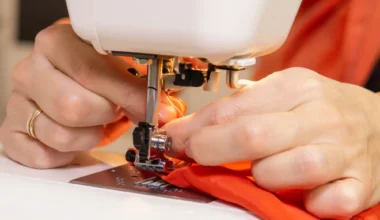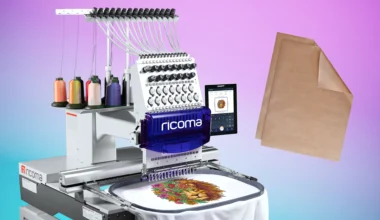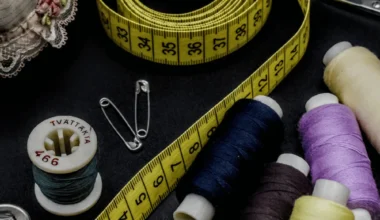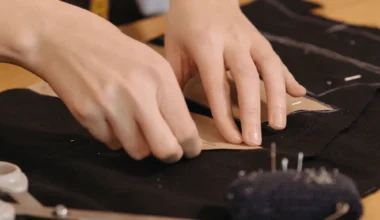Does the thought of starting a new sewing project excite you? Do you often describe yourself as crafty and hands-on? Are you looking to take your sewing to the next level?
If you answered “yes” to any or all of these questions, it may be time to ditch your domestic sewing machine and upgrade to an industrial model.
With an industrial sewing machine, you can do so much more than just hem your favorite pair of jeans. Of course, you can do that too, but honestly, the possibilities are endless. You can create customized caps or try your hand at sewing thick, hard-to-sew materials like leather, quilts and even shoes!
With all that in mind, we understand the amount of time and consideration that goes into finding the perfect sewing machine, which is why we’re helping you make your decision even easier.
In this blog we’ll go over the top 5 reasons why you should consider upgrading to an industrial model.
- Reason #1. Sew anything & everything you couldn’t with a domestic model
- Reason #2. Save time and money
- Reason #3. Sew all day, every day
- Reason #4. Get everything you need to get started
- Reason #5. Make money doing what you love
But before we get into why you should invest in an industrial sewing machine, let’s briefly discuss the different types of industrial sewing machines and what they’re best used for.
Different types of industrial sewing machines and their use

Unlike domestic sewing machines that are designed to sew the occasional button hole or hem a pair of jeans, industrial machines are designed for frequent use and can be used to sew thick materials like leather, caps, purses and even shoes.
The five most commonly used industrial sewing machines are:
- Lockstitch Sewing Machines: Sew together garments that would be too difficult to do on a home machine, such as denim, cloth, knitted materials and much more!
- Chainstitch Sewing Machines: Use these stretchy stitches to hem a pair of jeans and other types of pants.
- Overlock / Serger Sewing Machines: Sew over the edge of one or two pieces of fabric to create seamless borders that you can’t achieve with a domestic sewing machine.
- Coverstitch Sewing Machines: Perfect for creating a professional finish on aerobic wear, fleece, knitted and super stretchy fabrics.
- Bar Tacker Sewing Machines: Great for reinforcing areas of a garment that are subject to stress, like pocket openings, button holes, belt loops and more.
Now, let’s get into the top 5 reasons why you should add one of these industrial sewing machines to your home or office.
Reason #1: Sew anything & everything you couldn’t with a domestic model

With more than five different types of industrial sewing machines to choose from, you’ll be able to sew onto a variety of different materials and fabrics that you wouldn’t otherwise be able to with a domestic sewing machine.
For example, with a post-bed lockstitch machine, like the iKonix KS-810, you can stitch rounded or non-flat items, like caps, shoes, purses and more.
Click here to get FREE SHIPPING on the iKonix KS-810 industrial sewing machine.
This is made possible by a raised, vertical column that works to connect your needle with your garment way above the surface of the sewing bed. Standard domestic sewing machines only offer flat sewing surfaces, which as its name implies makes it difficult if not impossible to sew anything other than flats.
To sew more intricate details, check out the iKonix FY0058A-1 chainstitch industrial sewing machine, which is perfect for sewing decorative seams onto items like pant hems, shirt sleeves, bedding, leather goods, and much more.
Note: There is a limited supply of iKonix FY0058A-1 sewing machines, so click here to purchase yours today before they go out of stock.
When looking for an industrial sewing machine, you may also want to consider a flat-bed model, like the iKonix (formerly Yamata) KS-0303. This walking foot, flat-bed machine is perfect for stitching flat items like shirts, jackets, totes and more.
The walking foot on this machine is used in place of a stationary presser foot to grip the fabric and pull it evenly through the machine. This comes in handy when sewing multiple layers of fabric as it prevents the layers from shifting, which often results in distorted designs and puckering.
The iKonix KS-0303 also features a 15 mm high presser foot to help you sew the bulkiest and thickest of items, like leather, upholstery, canvas, tents, bags and more.

Not only can an industrial sewing machine sew on a variety of materials and fabrics that domestic sewing machines can’t, but you’ll also notice that the quality of your stitches is much better on an industrial sewing machine.
This is because, unlike your domestic model, each machine is built to perform a specific task. With that, there is no need to adjust your machine’s thread tension based on what type of stitch you are performing. This helps to ensure a perfect stitch every time.
For example, the Yamata FY0058A-1 is a high-speed, single-needle, flat-bed industrial sewing machine that is perfect for sewing decorative seams onto pant hems, shirt sleeves, bedding, leather and more.
To get a better understanding of what you can sew with a post-bed or flat-bed industrial sewing machine, check out the graphic below.

Keep in mind, while post-bed and flat-bed industrial sewing machines are the most common, there are also overlock and bar tacking machines that you can choose from as well.
Our iKonix KS-757A high-speed five-thread overlock industrial sewing machine can do things ordinary sewing machines can’t, like join fabric edges with overlock stitches. This machine creates these stitches by using five different threads, which is more than any domestic sewing machine has. This helps to cover raw fabric edges and give finished products, like shirts, a professional look.
Click here to learn more about the iKonix KS-757A industrial sewing machine.
Bar tacking machines, like our Yamata-FY1850 and FY1850-02, are used to reinforce areas of a garment that may be subject to stress or additional wear, like pockets, button holes, belt loops, pleats and more. You can adjust the length and width of your stitches to allow for a certain amount of flexibility, depending on your garment.
Still not convinced that an industrial sewing machine is right for you?
Let’s talk about how you will save time and money with an industrial sewing machine.
Reason #2: Save time and money
Believe it or not, the secret to saving you time and money is your sewing machine’s motor.
But, before we get into exactly how that’s possible, first we need to discuss the two different types of industrial sewing machine motors: clutch and servo.
Clutch motors are the older generation of motors, and they run constantly when the machine is on. When the clutch engages, it creates a force to move the wheel.
Servo motors are electronic and only run when you press on the foot pedal. This uses less electricity and is not as hard on your ears while sewing. You will also be able to stitch at slower speeds with the servo motor, which is great for small details or work with visible seams.
We’ll talk more about the different motors in greater detail in the next section. For now, let’s focus on how much time you can save with an industrial sewing machine.
To do that, let’s see how many t-shirts you can sew in a given hour.
First, you’ll need to know the speed of your machine. For example, the iKonix KS-8700 flat-bed lockstitch industrial sewing machine, which specializes in sewing together light-to-medium garments like denim, cloth and knitted materials, has a top speed of 5,500 stitches per minute. For comparison purposes, most domestic sewing machines top off between 750-1,000 SPM.
To purchase the iKonix KS-8700 and save with FREE SHIPPING, click here now while supplies last.

Now, how many stitches are in your project?
Let’s say you’re sewing a men’s t-shirt, which is typically 20,500 stitches. That means, in theory you could potentially finish one t-shirt every 5 minutes with the iKonix KS-8700 as opposed to one t-shirt every 20 minutes with a domestic sewing machine.
Now, let’s see how many men’s t-shirts you can complete in an hour using an industrial sewing machine vs how long it would take to do the same order on a domestic machine.
As you can see, you’re going to be able to sew at higher speeds and finish more in less time.
To save even more time, many of our industrial sewing machines, like the iKonix KS-820 and Yamata-FY875, have two needles, which means they can create two lines of stitches instead of just one. This saves you a lot of time compared to domestic sewing machines, which require you to run the fabric through the machine twice just to sew another row of stitches.
Click here to shop industrial sewing machines and get FREE SHIPPING before this offer expires.
But stitch speed isn’t all about how fast you can finish your project. It’s also hugely important in the overall quality of your finished product, which ties into saving you money.
For example, when sewing smaller, more detailed garments that require more precision like leather patches, or work with visible seams, it’s important to slow down your machine. If you attempt to sew one of these items or any other form of delicate fabric at max speeds, you run the risk of ruining your garment by tearing it. Now you need to replace it, which of course costs money.

With a servo-motor industrial sewing machine, slowing down your machine is as easy as easing your foot off the pedal.
You can also slow down a clutch motor with a device known as a speed reducer. These work by applying more torque between the motor and the machinery that is used to supply power to the machine. You can essentially cut your machine’s speed in half but you don’t have as much control over the speed as you would with a servo motor.
Speed reducers, or servo motors are absolutely necessary if you plan to stitch on leather, upholstery or other thick materials because you’ll need to control the stitches with better precision to create clean and professional-looking stitches.
Now, you’re probably wondering, “what’s the price difference?”
A typical speed reducer costs approximately $150-$300 and most clutch motors go for about $200-$300. A servo motor is approximately $200. So, you can save more than $150 when you get an industrial machine with a servo motor right off the bat.

And for your convenience, all of our industrial sewing machines come with servo motors so you can start sewing leather, upholstery and other items as soon as you receive your machine.
Click here to shop our selection of high-quality industrial sewing machines before they’re sold out.
Reason #3: Sew all day, every day

When you buy an industrial sewing machine you can sew with confidence knowing that your machine is built to run all day every day. In fact, we’ve seen industrial sewing machines last as long as 25 years with proper storage and maintenance. Most domestic sewing machines have a life expectancy of 5-10 years.
Note: We’re currently offering FREE SHIPPING on all industrial sewing machines for a limited time only, so click here to take advantage of this offer now.
Now, you may be asking how is it possible for a machine to run 365 days a year for up to 25 years? That’s more than 200,000 hours in 9,125 days! It all comes down to the three removable parts that make up an industrial sewing machine:
- The head
- The motor
- The table

Because each of these parts are separate pieces, it’s easy to replace or upgrade them as needed, or even to customize your machine to fit your needs.
For example, maybe you want to get a bigger sewing table to accommodate larger projects, or upgrade your motor. As mentioned earlier, there are two types of industrial sewing machine motors: clutch and servo. Both are built to run non-stop so you can use your machine day in and day out without fear of it burning out.
In addition to powerful, reliable motors, industrial machines are manufactured with durable materials built to withstand frequent use. For example, most industrial sewing machines, like the Yamata FY0058-A single-needle chainstitch, are made of high-quality steel, whereas domestic machines are made largely of plastic.
Of course, you get what you pay for. For instance, industrial sewing machines typically cost a bit more than domestic machines ranging between $700 – $1,600. Domestic models can cost anywhere from $150 to $1,000.
And don’t forget, we’re offering FREE SHIPPING on all industrial sewing machines, so you’ll save more money with Ricoma than with any other brand. Simply click here to take advantage of this special offer before it’s too late.
But when it comes to durability, reliability and performance, there’s no comparison.
Speaking of comparisons, let’s take a look at the one below as a quick recap of what we’ve covered in this section.
When you take into consideration all of the added benefits that you get with an industrial sewing machine, it is by far the superior choice, especially when you realize that all of our industrial sewing machines come with everything you need to get started.
Click here to order your industrial sewing machine with FREE SHIPPING while supplies last.
Reason #4: Get everything you need to get started

All of our industrial sewing machines come with everything you need to get started, including a servo motor, stand, LED light and sewing table. We’re even removing all shipping fees from every sewing machine for a limited time only to give you the best bang for your buck! This means you will instantly benefit by investing in a high-quality yet affordable machine with all the bells and whistles!
Now, to help you visualize your potential workspace, imagine a 20” x 47” sewing table that comes with the Yamata FY0058-A1 single-needle chainstitch industrial sewing machine. With this added space, you can sew large, bulky garments like blankets, curtains, jackets and even wedding gowns with ease.
But the built-in sewing table can be used to sew smaller, more detailed projects like patches and button holes as well. Since the table is built specifically for each sewing machine, you’ll have the stability you need to sew those precise stitches.

Speaking of perfection, did you know that the weight of your machine plays a huge role in the quality of your stitch?
Think about it. When sewing, it’s natural to experience a bit of bounce or vibration, especially when sewing at high speeds. This is caused by the needle moving up and down. Because a domestic machine weighs just a few pounds, it’s easy for your garment to shift, which often results in inconsistent stitching.
To combat this issue, our industrial sewing machines, like the Yamata FY0058A-1 single-needle industrial sewing machine, weigh approximately 100 lbs, which when combined with the stand and sewing table help to minimize those inconsistencies so that every stitch is as perfect and uniform as the last.
Another reason why industrial sewing machines are larger than domestic models is because they often come with a long-free arm. This device allows you to sew bigger projects and extra-heavy fabrics like canvas, vinyl, leather and other coated materials.
The long-free arm also leaves more room for fabric to pass by on the right side of the needle. This comes in handy when you are sewing several pieces of thick fabrics together. It’s not easy to bend or move the fabrics around so you will need that extra space.
To learn more about the major differences between a domestic and an industrial machine, take a look at the comparison chart below.

When you invest in an industrial sewing machine, you also gain exclusive access to unlimited training and support from certified technicians that are available 7 days a week and after hours to answer all of your sewing machine questions.
If you’re ready to take your sewing to the next level, click here to browse our top-rated industrial sewing machines today before they’re sold out.
But before you go, there’s one last thing you need to know. When you invest in an industrial sewing machine, you can make money doing what you love!
Reason #5: Make money doing what you love
Have you always dreamed of starting your own custom apparel side hustle but have been overwhelmed by the different decorating tools that are out there?
You’re in luck because everything we’ve covered up until this point has been to help prepare you to take that next step so you can start making money doing what you love.
Whether you’re a beginner or an existing custom apparel business owner looking to add more variety to your shop, an industrial sewing machine is the perfect tool to get you started.
Since all of our industrial sewing machine packages come with everything you need, including FREE SHIPPING, there’s just one thing left to cover: profit potential.
Let’s jump in.

For this example, let’s use the iKonix KS-810 single-needle post-bed lockstitch sewing machine, which is currently in stock at shop.ricoma.com.
Using this machine, you can easily make money sewing embroidered patches onto caps and you don’t even need an embroidery machine. You can easily purchase ready-to-sew patches from sites like Etsy, or by simply searching Google for “embroidered patches.”
Embroidered patches typically cost between $3-$5, but you can also expand your offerings to include leather patches. These are typically a bit more expensive, averaging at around $5-$7, depending on the supplier. But you can usually charge a bit more for the finished product so it evens out.
The average cap order is 10 caps. That’s an extra $150 in your pocket!
And to sweeten the pot, we’ve made it even easier to afford your new industrial sewing machine with financing options through shop.ricoma.com. You can pay off your new iKonix single-needle post-bed lockstitch machine with affordable monthly payments.
Regardless of what industrial sewing machine you choose, you’ll be making money doing what you love. Honestly, it doesn’t get much better than that.
Bottom line
With five styles of industrial sewing machines to choose from, you’re bound to find the perfect fit for you.
So, when you’re ready to invest in your next sewing machine, remember this: an industrial sewing machine is guaranteed to save you time and money, and offer you an opportunity to make a profit doing what you love.
















